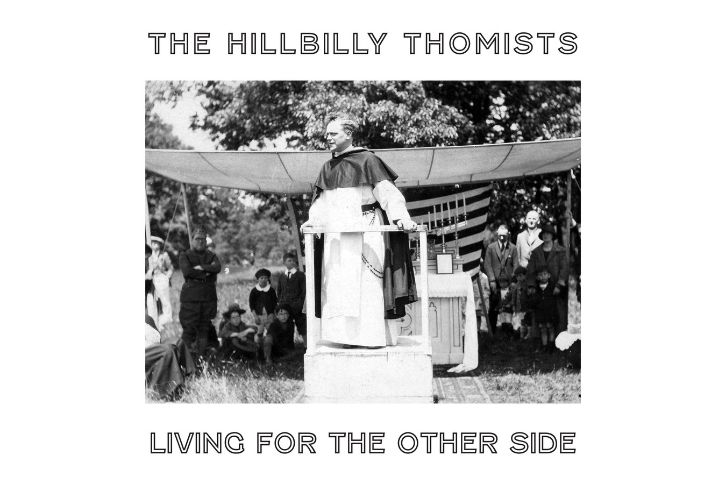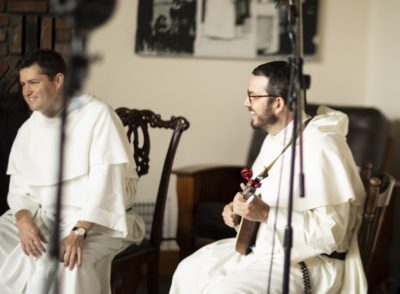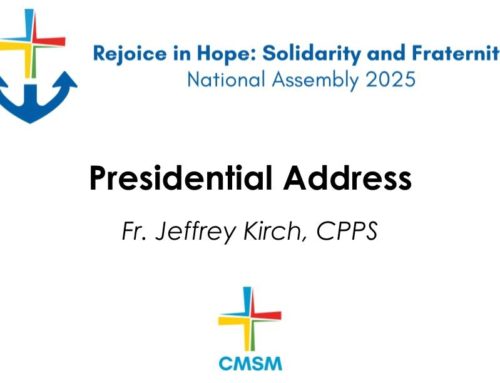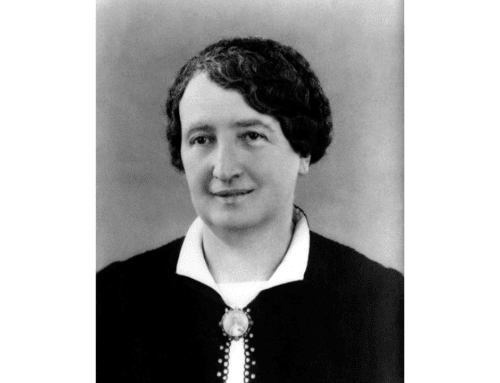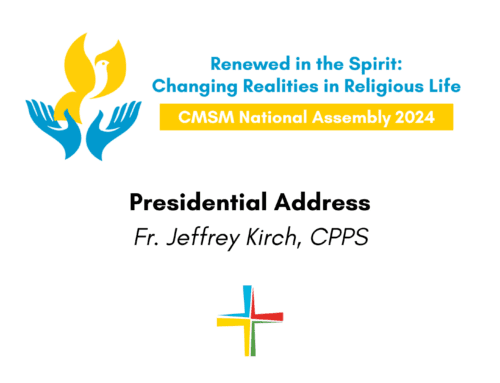The Hillbilly Thomists released their second studio album in January 2021. In this review, Sr. Mary Ruth O’Brien, OP, explores the album through the lens of the Dominican charism of preaching. She argues it weaves together St. Dominic’s emphases on joy and penance, a depiction of the violence of the world as a possible occasion for grace, and the accessibility of bluegrass music to create an effective and unique musical experience. Click here to download a copy of this review.
“A gentleman is someone who knows how to play the banjo, and doesn’t.”
This quip, attributed to Mark Twain,[2] points to the paradox in the question: how do “Dominican” and “hillbilly music” go together? Could grass-roots mountain tunes be a fitting outlet for the Dominican charism of preaching? At first glance an unlikely combination, the task of Dominican preaching harmonizes surprisingly well with two aspects of bluegrass: its Gospel themes and its aura of home-grown authenticity. Capitalizing on these qualities, the Hillbilly Thomists’ 2021 album Living for the Other Side taps into the rich preaching tradition of St. Dominic. There are two key players in the story of how the Hillbilly Thomists capitalize on the Gospel themes of bluegrass. The first is American Catholic writer Flannery O’Connor with her special way of bringing God’s grace into her stories. Next is bluegrass pioneer Bill Monroe, who points out the genre’s unique power to prepare the listener’s mind and heart for that grace. Monroe says of bluegrass, “It’s got a lot of good meaning in it . . . It’s also close to Gospel—and the people that love the music can feel that in there. The feeling in the music is bound to touch their heart.”[3] Bluegrass is an ideal medium for preaching, and the Hillbilly Thomists make the most of it by using lyrics in some of their songs that reflect the influence of Flannery O’Connor, who is the inspiration behind the group’s name.[4]
O’Connor was aware that “violence is strangely capable of returning my characters to reality and preparing them to accept their moment of grace.”[5] To this end, she is known to set up a contrast between the normal flow of her characters’ daily lives, and the disturbing moments of a violent event.
Inspired by O’Connor, the Hillbilly Thomists use this kind of contrast in some of their songs. On this album, “Bourbon, Bluegrass and the Bible” (track 3), with its reference to Uncle Pen, is an example. Bill Monroe wrote a song[6] about his mother’s brother Pendelton Vandiver, who took him in after his parents died. In Monroe’s song, he describes his Uncle Pen as a lively country fiddler: “When the caller hollers, ‘do-se-do’/ You knew Uncle Pen was ready to go.” The song’s refrain memorializes his finesse as a musician, characterized by strong phrasing and tone color: “Uncle Pen played the fiddle, Lord how it would ring/ you could hear it talk, you could hear it sing.” In the Hillbilly Thomists’ song, “Bourbon, Bluegrass and the Bible,” however, Uncle Pen’s apparently placid daily life is interrupted by a sudden life-threatening danger for which he loads his gun in defense: “Sit up straight and clean your face. We done gotta get outta this place. / Uncle Pen is loading his gun. You start to walk, I’ll start to run.”[7] For all we know of Uncle Pen, this is extraordinary. This contrast between Uncle Pen’s daily life and the sudden threat of violence could awaken in his soul an awareness of its deep need for God and of God’s corresponding gift of grace. God can use or allow violence to bring about this offering of grace: “When the Lord hit me, he hit me pretty good.”[8] What is at stake here is the soul’s eternal life with God, even though the event of eternity disrupting time, for Uncle Pen as for O’Connor’s characters, “doesn’t always feel nice.”[9]
Does unexpected violence, as a possible point of access to receiving God’s grace, have a precedent in Dominican tradition?
St. Dominic’s love for penance exemplifies the sharp contrast between avoiding the sometimes violent grace of the Cross and embracing it. During a typical day on the road with St. Dominic as he traveled to preach, his companions noticed that St. Dominic would “get great delight from anything untoward that happened to him on the way. For example, if he tripped over a stone, his face would light up as he said, ‘This is doing penance!’”[10] Traveling on foot, he carried his shoes and put them on when they arrived at their destination. He practiced this even when he and his companions lost their way and unwittingly asked directions from their persecutors, who led them through thorns and thistles so that “their feet and legs became quite covered in blood. The man of God endured all this with the utmost patience; breaking out into a hymn of praise to God, he encouraged the others to praise God too and to be patient.”[11] Enemies who sought to ambush him on his path to take his life were surprised and somewhat deflated when they found that it was St. Dominic’s desire “to be whipped and cut up for the name of Christ.”[12] St. Dominic’s openness to penance has a certain resemblance to Flannery O’Connor’s method of using violence as an invitation to grace: the reality of God’s grace is “something to which we must be returned at considerable cost.”[13] O’Connor shocks her readers through what Fr. Thomas Joseph White calls “violent Southern gothic imagery”[14] in order to dispose them for God’s grace, while St. Dominic recognizes God’s grace in these violent events, and shocks us by rejoicing in them. Yet, how did St. Dominic find joy in suffering? St. Dominic’s “Nine Ways of Prayer,”[15] provides an insight. Here, he prays explicitly that he and his Order would find joy in living out the Beatitudes:
And it is believed that . . . [Dominic’s] prayer won from God . . . for himself and his brethren, such delight and enjoyment in putting the Beatitudes into practice, that each one would consider himself blessed in the most profound poverty, in bitter grief, in severe persecution . . .[16]
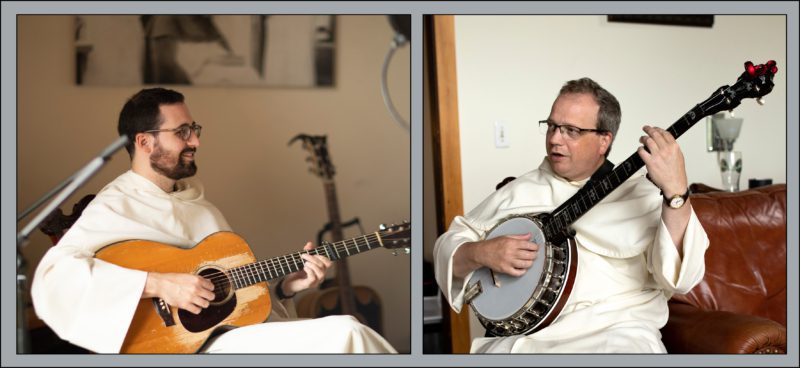
Fr. Peter Gautsch, OP (left) and Fr. Thomas Joseph White, OP (right) (Photo courtesy of Paul Padgett)
So for St. Dominic, penance and other trials did not result in sadness. Rather, because he was rooted in the beatitudes, finding the joy of union with Christ in living them, he was able—and encouraged his Order—to maintain a joyful attitude in prosperity or adversity.
In 1223 St. Dominic welcomed into the Order Blessed Jordan of Saxony (1190–1237), who succeeded him as Master General. Like Saint Dominic, Blessed Jordan experienced the wisdom of the Beatitudes as the key to happiness. The following account from Lives of the Brethren shows Blessed Jordan’s appreciation of “delight and enjoyment” in the authentic freedom of the Gospel. He was traveling to Genoa with a group of young Dominicans who had recently entered the Order. They stopped overnight at a Dominican monastery, and joined the Friars for night prayers in the chapel.
As they were all saying compline together, one of them fell to laughing, and the rest catching on, joined in right heartily. Upon this, one of the blessed Master’s [Jordan’s] companions made a sign for them to be quiet, which only set them off laughing more than ever. . . When the blessing had been given at the end of compline, the Master. . . addressing the novices very gently, said, ‘Laugh to your hearts’ content, my dearest children, and don’t stop on that man’s account. You have my full leave, and it is only right that you should laugh after breaking from the devil’s thralldom, and bursting the shackles in which he held you fast these many years past. Laugh on, then, and be as merry as you please. . . [17]
Blessed Jordan identifies as the cause of the novices’ laughter with their new-found freedom as children of God. Although perhaps a breach of religious decorum, their laughter during compline is, in Blessed Jordan’s estimation, excusable in that moment because it expresses their authentic freedom and joy in Christ.
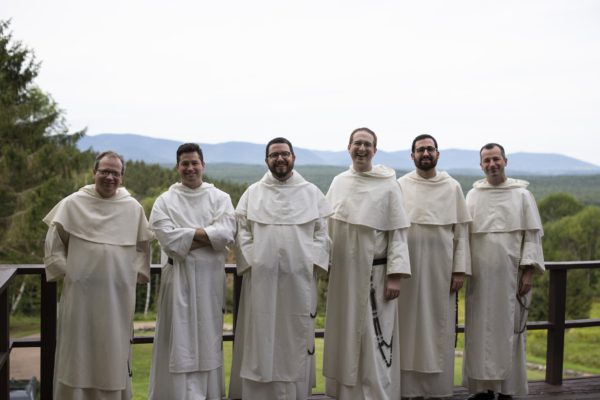
The Hillbilly Thomists who recorded Living for the Other Side, (left to right) Fr. Thomas Joseph White, OP, Fr. Jonah Teller, OP, Fr. Austin Litke, OP, Fr. Joseph Hagan, OP, Fr. Peter Gautsch, OP, and Fr. Justin Bolger, OP (Photo courtesy of Paul Padgett)
Rejoicing and levity often accompany the truth of the Gospel, and this is true in Americana grassroots music. A heavenly message with a twist of earthly humor is bluegrass at its best. Living for the Other Side can produce laughter, not just because of clever lyrics, but because the lyrics recall man’s liberty to be genuinely himself in Christ. For example, how does the gritty vocal quality of the refrain of “Bourbon, Bluegrass and the Bible” make the whole song more effective, and at the same time, amusing?
Death’s in the world and it’s gone viral /Everybody’s talking ’bout a new revival /When it’s a question of love and survival /Bourbon, bluegrass and the Bible.
Certainly, the context of the narrator’s refrain partly explains it: when the going gets rough, allow for creature comforts like bourbon, sing a down-to-earth bluegrass song, and rely on the God of the Bible. These lyrics, combined with the rugged vocal quality, somehow lighten the song’s message enough to make it enter the listener almost unnoticed. The net effect is free of polish and can occasionally dispose the listener to laughter. But it consistently evokes wonder at the “freedom of the children of God” (Rom 8:21, NABRE). The pure of heart “can laugh in a freedom that creates freedom in others.”[18]
One reason why the natural, home-grown quality of bluegrass is an obvious match for expressing what is authentically human is its origin in folk music. Migrants from Ireland, Scotland and England who settled in southern rural America brought their folk songs with them, thus contributing to bluegrass one of its important sources. Folk songs have an intrinsic power to resonate deeply with the listener’s life experience. Joseph Ratzinger observes that folk music “springs from original contact with the fundamental experiences of human existence and is therefore an expression of truth.”[19] His perspective clarifies and elevates ideas about folk music:
. . . folk music in its original sense is the musical expression of a clearly defined community held together by its language, history, and way of life, which assimilates and shapes its experiences in song – the experience with God, the experiences of love and sorrow, of birth and death, as well as the experience of communion with nature.[20]
“I Heard the Voice of Jesus Say” (Track 11) derives from a folk song that expresses a striking level of resonance with what is authentically human. Ralph Vaughan Williams, a composer and British collector of folk songs, originally popularized this tune as a hymn. He named it Kingsfold[21] after the village in northwest Sussex where he discovered it. His comment on first hearing the tune expresses a profound sense of recognition: “Here is something which I have known all my life – only I didn’t know it.” [22] His words convey the immediate yet mysterious nature of folk music’s ability to echo back to the human person an integrity that is more fundamental than his own restlessness. The Hillbilly Thomists’ arrangement of “I Heard the Voice of Jesus Say” on this album has a gentle austerity that allows the melody itself to affect the listener.
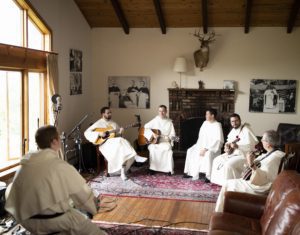
In the midst of arranging a song. (Left to Right) Fr. Joseph Hagan, OP (facing the group), Fr. Peter Gautsch, OP, Fr. Justin Bolger, OP, Fr. Jonah Teller, OP, Fr. Austin Litke, OP, Fr. Thomas Joseph White, OP (Photo courtesy of Paul Padgett)
Authentic freedom also manifests itself in the Hillbilly Thomists’ simple and natural approach to their recording process. They prefer to record the vocals live as much as possible, working with microphone placement to create a proportionate distance between lead and backing vocals in the existing acoustical setting of their space. They also prefer to record the vocals while playing their instruments. “When accompanying live vocals in recording, you naturally support the vocals and overall flow of the song with the instruments,” Fr. Justin Bolger, OP notes in an e-mail interview. In this way, as opposed to overdubbing each individual vocal and instrumental track, the friars sought to capture the dynamic of a live performance. Fr. Jonah Teller, OP comments on the outcome, “The joy that we had recording the music is palpable on the album itself. That’s something that you can’t really replicate just by piecing together a song in a studio.”[23] And what if the results are at times a bit scrappy? Fr. Bolger responds, “I think scrappy is appropriate for the bluegrass/folk/Americana genre, so it works in our favor!” The result is a lively expression of the “glorious freedom of the children of God” (Rom 8:21, NABRE).
In summary, how do “Dominican” and “hillbilly music” go together? Why are these twenty-first century Friars in their thirteenth-century habits performing at the Appaloosa Music Festival? In the words of Fr. Teller, “The preacher can make use of any good thing for the sake of furthering the Gospel.”[24] Influenced by O’Connor’s depiction of God’s grace and how it works in her stories, the Hillbilly Thomists have made a perhaps unique contribution to bluegrass with its Gospel themes. The authentic vocal quality and recording style on this album suggest and even enact man’s liberty in Christ to be genuinely himself. in Living for the Other Side these two aspects of bluegrass combine in effective and joyful preaching. Eight hundred years after his death in 1221, St. Dominic is still praying for his preachers to receive “delight and enjoyment in putting the Beatitudes into practice.” His prayer is bearing fruit in The Hillbilly Thomists.
For Further Reading
Murray, Paul, O.P. 2006. The New Wine of Dominican Spirituality – A Drink Called Happiness. London: Burns & Oates.
O’Dell, Cary. 2002. “Blue Moon of Kentucky”. Loc.gov. Accessed September 09, 2021. https://www.loc.gov/static/programs/national-recording-preservation-board/documents/BLUE%20MOON%20OF%20KENTUCKY.pdf.
Header photo: Album cover for “Living for the Other Side,” designed by Fr. Paul Clarke, OP.
References
[1] Grotto Network, 2020. The Hillbilly Thomists at Appaloosa Music Festival. January 6. Accessed July 20, 2021. https://www.youtube.com/watch?v=gsONUo3btgs.
[2] Quote Investigator. April 21, 2019. https://quoteinvestigator.com/2019/04/21/cornet/#note-135718-16.
[3] Richard Harrington, “Bill Monroe.” The Washington Post, June 7, 1981.
[4] The Hillbilly Thomists’ name comes from a passage in the letters of Flannery O’Connor where in 1955 she wrote: “Everybody who has read Wise Blood thinks I’m a hillbilly nihilist, whereas . . . I’m a hillbilly Thomist” (Letter to Robie Macauley of 18 May 1955, in The Habit of Being, ed. Sally Fitzgerald (New York: Farrar, Strauss, and Giroux), 81).
[5] Flannery O’Connor, “On Her Own Work,” in Mystery and Manners, eds. Sally and Robert Fitzgerald (New York: Farrar Strauss and Giroux, 1969), 112. This was originally a talk given at Hollins College on October 14, 1963 before a reading of O’Connor’s short story “A Good Man is Hard to Find.”
[6] “Blue Grass Lyrics”. 2016. https://www.bluegrasslyrics.com/song/uncle-pen/.
[7] Lyrics from “Bourbon, Bluegrass and the Bible.”
[8] Lyrics from “Bourbon, Bluegrass and the Bible.”
[9] A phrase from “Chasing Money No More” (Track 7 of Living for the Other Side).
[10] Simon Tugwell, Early Dominicans: Selected Writings. (New York: Paulist Press, 1982), 75.
[11] Tugwell, Early Dominicans, 88.
[12] Tugwell, Early Dominicans, 75.
[13] O’Connor, Mystery and Manners, 112.
[14] Fr. Jacob Bertrand Janczyk, host. Fr. Patrick Briscoe, Fr. Thomas Joseph White, Fr. Justin Bolger, and Fr. Jonah Teller, guests. November 19, 2020. In “Episode 068: The Hillbilly Thomists, Vol. II”. Godsplaining Podcast, MP3 audio. 32:32. Accessed July 17, 2021. https://www.youtube.com/watch?v=PR9DNuKm1JE&t=1747s
[15] Tugwell, Early Dominicans, 75.
[16] Tugwell, Early Dominicans, 99.
[17] Lives of the Brethren, trans. Placid Conway (London: Blackfriars Publications, 1955), 127.
[18] Josef Pieper, A Brief Reader on the Virtues of the Human Heart, trans. Paul Duggan (San Francisco: Ignatius Press, 1991), 44.
[19] Joseph Cardinal Ratzinger, A New Song for the Lord (New York: The Crossroad Publishing Company, 1997), 107.
[20] Ratzinger, A New Song for the Lord, 107.
[21] Originally known as “The Star of County Down”, the modal melody of Kingsfold blends well with another folk tune, “Moorlough Mary” or “The Foggy Dew”, listed as Roud Folk Song Index 558. (Listen to it here.) Vaughn Williams Memorial Library, English Folk Dance and Song Society. https://www.vwml.org/song-subject-index. Ralph Vaughan Williams based his composition, “Five Variants of Dives and Lazarus” on this tune.
[22] Raymond Glover, ed. The Hymnal 1982 Companion (New York: The Church Hymnal Corporation, 1994), 454.
[23] Fr. Jacob Bertrand Janczyk, host. Fr. Patrick Briscoe, Fr. Thomas Joseph White, Fr. Justin Bolger, and Fr. Jonah Teller, guests. November 19, 2020. In “Episode 068: The Hillbilly Thomists, Vol. II”. Godsplaining Podcast, MP3 audio. 32:32. Accessed July 17, 2021. https://www.youtube.com/watch?v=PR9DNuKm1JE&t=1747s
[24] Ibid.

